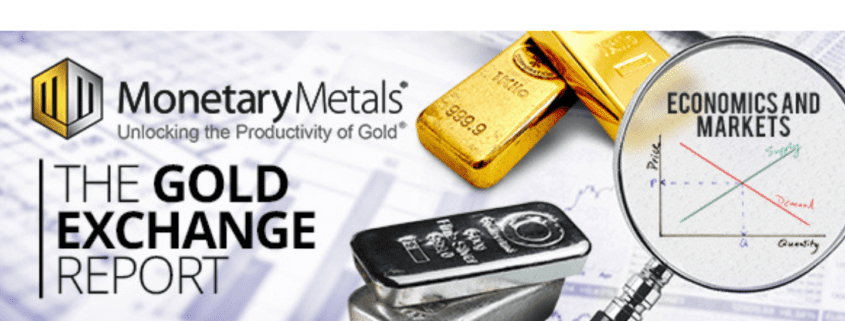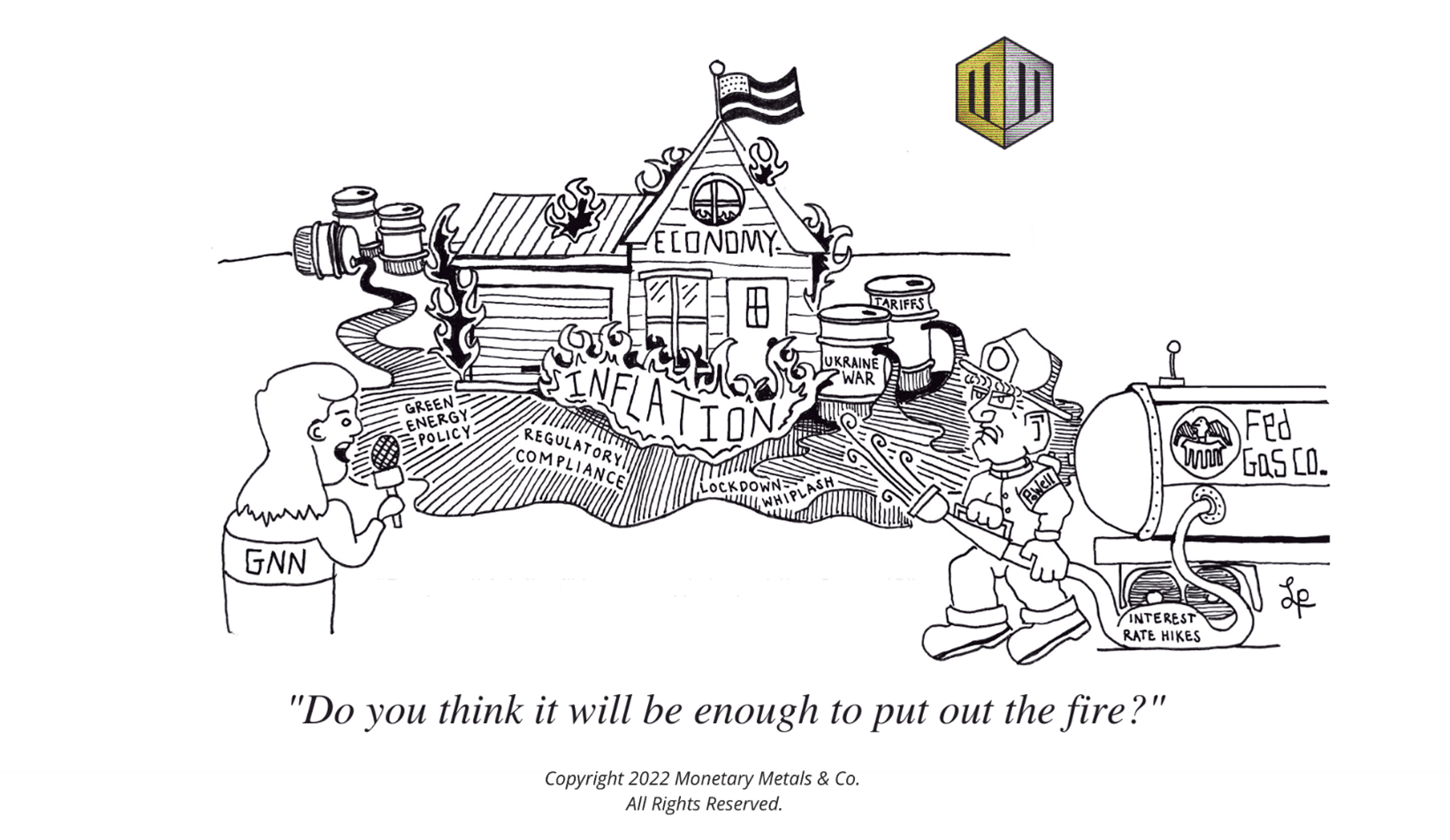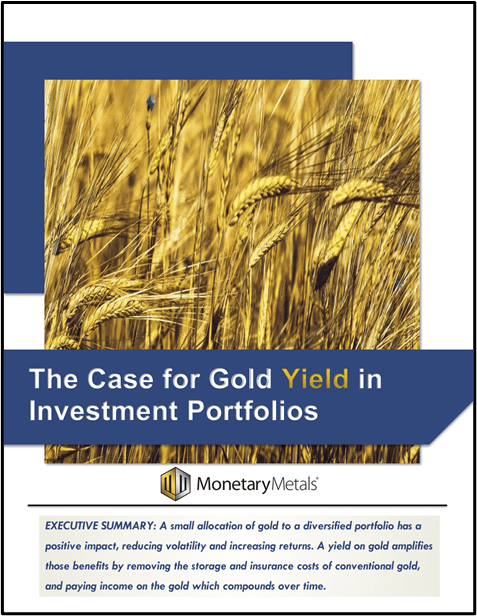Will Interest Rate Hikes Fix Inflation?
Senator Elizabeth Warren and President Joe Biden claim that inflation[i] is caused by greedy corporations. And they propose to solve this problem by making the corporations pay. Whether it’s extracting a “windfall profits” tax, crushing them under even more regulation, or attacking them with antitrust enforcement, the idea is the same. They propose to harm the corporations which produce the things we need such as energy and food, which will somehow cause prices to drop. They think that hurting producers will do good to consumers.
Think about this. Take as long as you need.
This kind of blatant zero-sum, win-lose view is the essence of socialism. It may be popular among the Left, but fortunately it is outside the mainstream.
The Quantity Theory of Money is Dead Wrong
However, there is a more subtle zero-sum view about money. According to the Quantity Theory of Money, a rising money supply causes rising prices, and rising prices are caused exclusively by a rising money supply (I have written extensively about nonmonetary forces driving up prices: mandatory useless ingredients, lockdown whiplash, green energy restrictions, trade war and tariffs, and actual war in Ukraine. For a complete review of this analysis, download our Gold Outlook Report 2022).
Prices have certainly been on a tear recently. The Consumer Price Index is over 8% for the first time in a very long time. So, what is the Fed to do about it, what central plan should it impose?
The Quantity Theory holds that, to control inflation, the Federal Reserve should reduce the quantity of dollars, or at least reduce the rate of increase. It is supposed do this by hiking interest rates (it has hiked twice so far this year). At higher interest rates, the theory holds that there should be less new borrowing. Thus, the rate of new money coming into the economy is reduced. And inflation is supposed to be mitigated.
According to this theory, there is a tradeoff between unemployment and inflation. So, in order for consumers to get more for their money, workers need to be laid off.
But less borrowing, of course, means lower production. This logic commits a similar error as the above idea of harming producers. Only, the target here is the workers who produce the goods. To state the contradiction explicitly: fewer workers, producing less goods, will cause lower prices.
The Relationship Between Interest Rates and Prices
When interest rates are too low, it causes a myriad of ills. When interest rates are falling, it inflicts a number of different kinds of damages. However, if one’s sole concern were consumer prices, then one should want a falling interest rate.
To see why, put yourself in the shoes of the owner of a chain of hamburger restaurants. You are always thinking about expanding. But one thing stops you from building the next store: it would not make money. If the interest rate drops, this reduces a big expense. So you build a new store. The same is occurring at the cattle ranch which supplies you with meat, the manufacturer of grill equipment, and the trucking company which delivers it all to your store. Everyone sees a profitable opportunity to expand—to increase supply—when interest rates drop.
Unless the appetite for hamburgers also increases, the burger market has greater supply while the demand is unchanged. The price of burgers becomes soft (increasing mandatory useless ingredients may prevent the retail price from falling).
When the Fed hikes rates, this process is slammed into reverse. The first effect is that hamburger restaurants cannot build more stores, cattle ranchers cannot increase herd sizes, and makers of grill equipment cannot expand factories.
The second effect is that the marginal hamburger restaurant, cattle ranch, and grill factory can no longer cover their interest expense. They close, thus reducing supply.
The mainstream theory focuses on the quantity of dollars and the presumed relationship to prices. It misses the direct relationship between interest rates and production: lower rates provide an incentive to increase production, and higher rates remove that incentive.
While the Fed plays along with the Quantity Theory, so far its rake hikes have been tepid. This has prompted commentators to ask if the Fed’s hikes are enough to curb inflation.
Such questions are based on a flawed understanding of inflation. Rate hikes will push prices higher, not lower.
[i] I italicize words when I use them according to the mainstream definition. Inflation, properly understood, means the counterfeiting of credit. Borrowing without means or intent to repay, from unwilling or even unknowing lenders. This describes the issuance of dollars perfectly. But most people mean rising consumer prices, and that is what I address in this article.
Make sure to subscribe to our YouTube Channel to check out all our Media Appearances, Podcast Episodes and more!
Additional Resources for Earning Interest on Gold
If you’d like to learn more about how to earn interest on gold with Monetary Metals, check out the following resources:
In this paper we look at how conventional gold holdings stack up to Monetary Metals Investments, which offer a Yield on Gold, Paid in Gold®. We compare retail coins, vault storage, the popular ETF – GLD, and mining stocks against Monetary Metals’ True Gold Leases.
The Case for Gold Yield in Investment Portfolios
Adding gold to a diversified portfolio of assets reduces volatility and increases returns. But how much and what about the ongoing costs? What changes when gold pays a yield? This paper answers those questions using data going back to 1972.








I can’t help but be baffled by the common view that I am offered unemployment or inflation as my only two choices. I can go broke fast or slow, which do I prefer? This is insane.
Agreed 100%. See below.
As they say, this is all too stupid to be stupid. In other words, nobody can be this stupid and incompetent. Just by accident or chance, an ignoramus will occasionally make a correct decision. The destruction of the economy and our society is 100% intentional. You don’t have to think hard or long about why would certain people want to destroy the capitalist system? TPTB want to have people begging for someone to do something … PLEASE! And that is when they will build back better with their communist dictatorship. Communism has failed miserably every time it has been tried and killed hundred’s of million of people in the process. But these high IQ morons argue that it has never been done right in the past. The current system of crony capitalism/creditism/socialism based on fiat currency is completely broken and trash and should be restarted but with true capitalism based on a sound currency (gold) and the original constitution. A good dose of morals would help too.
Totally agree. But they won’t call it communism, perhaps something like stakeholder capitalism. That might actually be a fitting description too… they have driven a stake through the heart of capitalism, and nobody holds a promising future except the master planners.
If it was all so simple politicians wouldn’t have so many levers for manipulating the influence of various complications. Fixed demand cannot be altered by tinkering with interest rates. That demand will be met but at a higher price. Variable demand can be altered by tinkering with the perceptions of folks who participate in markets. No specific or absolute or consistent, theory-based outcome must be acheived to affect the perceptions of folks who have spending options. Businesses and individuals have spending options which they will exercise based on their perception of the value of the consequences they expect from their actions. They could be, and very often are, dead wrong in their perceptions in hindsight but real-world consequences are not dependent on the correctness of the perceptions which influenced the actions that caused them.
Yes, increased interest rates will increase prduction costs and therefore prices of finished goods.
Increased rates will also slow borrowing and shift perceptions towards savings or at least delaying previously anticipated borrowing. These consequences reduce demand often faster than businesses begin scaling back. Supply chain inventory gets backed up and must be liquidated…at any cost. Which is the situation recently described in the news about Target, Walmart and other retailers who have “stuck” inventory at the same time as demand is dropping like a stone.
I wouldn’t be surprised in this surreal time if some politicians started promoting looting as the most effective way to solve the stuck inventory crisis.